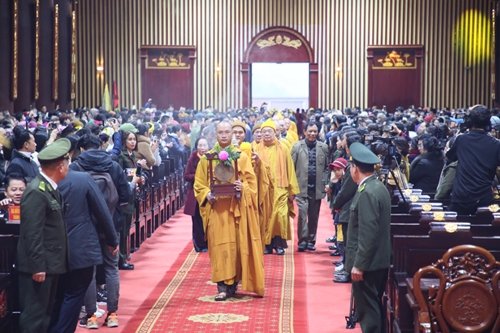A highlight of this year's festival is the grandest-ever procession ritual, featuring 11 palanquin teams from the city and the Vietnam Buddhist Sangha’s Quang Ninh province chapter.
    |
 |
|
A view of the opening ceremony (Photo: baoquangninh.vn) |
At the opening ceremony, Chairman of the city People’s Committee Pham Tuan Dat stated that the nomination dossier for the "Yen Tu – Vinh Nghiem – Con Son, Kiep Bac Monument and Landscape Complex," prepared by Quang Ninh, Bac Giang, and Hai Duong provinces, was officially accepted by UNESCO for review on January 26, 2024. He added that experts from the International Council on Monuments and Sites (ICOMOS) who conducted the on-site assessment last year praised the Yen Tu monuments as iconic cultural entities.
He described those as crucial steps towards establishing Yen Tu as a world heritage site, laying stress on the need to preserve the cultural treasures for future generations while leveraging them for sustainable tourism development.
The event featured drum performances and bell-ringing rituals and ceremonies praying for national prosperity.
Both Vietnamese and international visitors shared their impressions on the traditional festival. Do Ha Linh, a Vietnamese student studying in China, attended the festival for the third time, noting each visit helped her gain better insight into the spiritual culture of the complex. Meanwhile, Christian Veenman, a first-time visitor with a passion for Buddhist culture, expressed amazement at the grandeur and antiquity of the pagoda system.
The annual Yen Tu Spring Festival, opened on the tenth day of the first lunar month, represents a cherished Vietnamese cultural tradition, embodying the principle of remembering one's roots while preserving and sharing the timeless values inherited from previous generations.
Yen Tu Mountain is closely attached with the name of King-Monk Tran Nhan Tong (1258-1308), the third King of the Tran Dynasty, who defeated Mongol invaders twice during his 15-year reign.
The King abdicated when he was 35 and spent the rest of his life on Yen Tu Mountain practicing and popularizing Buddhism. He founded the first Vietnamese School of Buddhism called “Thien Tong” or Truc Lam Yen Tu Zen sect on the 1,068m-high Yen Tu Mountain. The 20,000ha site is considered the capital of Vietnamese Buddhism.
Yen Tu was recognized as a special national relic site in 2013. It is home to dozens of pagodas, hundreds of towers and thousands of ancient relics containing the spiritual values and thoughts of the Truc Lam Yen Tu Zen sect and the glorious culture of the Dai Viet period.
Source: VNA